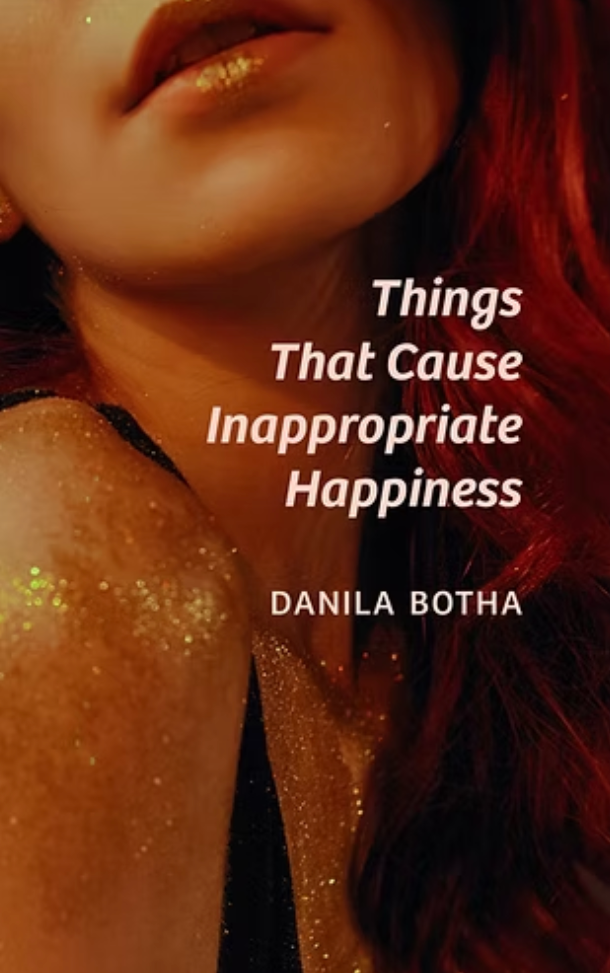
Things That Cause Inappropriate Happiness
April 8, 2025 | blog, book reviews

Review by Michela Polito, MFA ’25
Things That Cause Inappropriate Happiness
244 pp. Guernica Editions. $18.95
In Things That Cause Inappropriate Happiness, Danila Botha writes with wit, grit, and a sort of fictional non-conformity that resists easy labels. Across this generous collection, she unpacks a range of themes, spanning from alienation, identity, intergenerational trauma, and a sense of displacement delivered through historical fiction, magic and raw realism, and even what at times feels like personal essay.
A major thread running through the collection is the sense of not belonging—whether within one’s culture, in a new country, or in one’s own skin. Botha’s protagonists don’t fit in. They’re artists, free spirits, emotionally complex people stuck in religious or traditional contexts that feel suffocating. For example, being a liberal or creative woman in a strictly observant Jewish family—something I could relate to as someone raised with Catholic baggage—creates a constant push and pull between rebellion and a visceral sense of belonging in spite of oneself.
The pull of tradition is never completely denied. Quite the opposite: the oldest female family members— Aunt Mara, Bubbe, and Nagymama come to my mind to this regard—are some of the most magnetic figures in the book, with their domineering personalities shaped by Holocaust survivors’ resilience. They carry the weight of history, often with biting humor, and connect the protagonists to a lineage of survival, grief, and dark laughter. That specific tone—the gift of being able to talk about existential and historical disasters with an absurdist comic flare—is one of the collection’s greatest strengths.
In “Dark and Lilac Fairies,” Nagymama, the protagonist’s grandmother and former actress of the Hungarian National Theatre, tells her granddaughter about a game they played as Jewish kids during the war, in which two were the Gestapo and the rest Jews. She was the Gestapo and, in such a role, she was supposed to hit the other kids. To her horrified granddaughter, she brushed it off by saying, “If someone has to hit you, better it should be your friend.” Throughout the collection, the horror and absurdity are layered, never flattened.
Memory and trauma are central to other stories in the collection as well. “Proteksiye and Mazel,” one of the most haunting ones, features a fugitive Jewish young girl in a Nazi-occupied Lithuania. The tone is surreal, almost nightmarish, echoing the hallucinated atmosphere of German expressionist cinema. The story is followed by “Blasting Molly Rockets,” which is, instead, set in a modern urban environment and deals with identity and the courage to stay true to oneself, by expressing her culture, or better yet, counterculture, through literary and musical role models: William Burroughs and Marianne Faithfull. Throughout the story, Botha masterfully creates a strong, generational, cultural frame, pointing out her cultural self-awareness.
The stories “From the Belly of the Whale” and “Like an Alligator Eyeing a Small Fish” further juxtapose past and present. We jump from WWII to another contemporary urban setting, where characters drop into ketamine-induced blackouts. The alternation of past and present signals how trauma traverses time. Botha’s depiction of a ketamine-induced visit to Anne Frank is especially brilliant.
In “Able to Pass,” Botha leans into magical realism. Kayla, an art student, listens to her bubbe’s story about how she and her sister once tried to reproduce a Golem for protection during the war. Inspired, Kayla sculpts a kind of Golem-Matryoshka version of her family and brings some of them—Golda and her daughter—to life. Contemporarily, the sculptures crumble. The story reads as a charming sort of Jewish ritual of initiation, passed down in whispers and clay.
Although the stories break the mold of traditional plot structure—skipping inciting incidents, climaxes, and resolutions—this sacrifice never happens at the cost of engagement, and they remain emotionally gripping throughout.
Reading this collection is like listening to a cassette from the ’90s. While side A leans more toward the entanglement with Jewish heritage, its ghosts, its humor, and its pain, side B leans more toward present day emotional depth and raw realism. Bullying, disempowered mothers, toxic school cohorts, fake friends, and the sharp edges of adult relationships feel like a single soul transmigrating across stories, always evolving but holding tight to their core.
Alienation also plays out through immigration and displacement—whether it’s the struggle to adapt to a new, hostile environment, or the emotional cost of having forcefully extracted oneself from a former life, with the identity loss that follows. “All the Lives That Could Have Been” perfectly captures these concepts: The protagonist returns to her hometown and has to reckon with a former version of herself and a former lover. As an immigrant myself, I felt that sharp divide between past and present selves, and the cost of shedding a version of yourself in favor of an identity that allows you to survive elsewhere.
Things That Cause Inappropriate Happiness is a book full of visceral, unfiltered emotions, and in today’s world, that feels like a breath of fresh air.

I’m always grateful when I stumble upon a writer who is still into raw realism. But if that is accompanied by some magical realism—especially drug induced—even better. Botha’s exploration of identity and trauma never feels performative or cliched. On the contrary, it lives in her dark humor, her storytelling, and the deep absurdity she pulls from life—on this note “The Best Guy I’ve Ever Known,” which I won’t spoil, is absolutely hysterical.
This is the kind of book you read in one sitting, and then carry with you for a long, long time.
